Golang developers are at the heart of building high-performance applications and scalable systems. Their role is crucial in creating backend services, command-line apps, and even contributing to front-end codebases where Go is utilized.
Skills required for a Golang developer include proficiency in the Go programming language, understanding of concurrent programming, and familiarity with tools like Docker and Kubernetes. Additionally, they need strong problem-solving abilities and effective communication skills.
Candidates can write these abilities in their resumes, but you can’t verify them without on-the-job Golang Developer skill tests.
In this post, we will explore 8 essential Golang Developer skills, 10 secondary skills and how to assess them so you can make informed hiring decisions.
Table of contents
8 fundamental Golang Developer skills and traits
The best skills for Golang Developers include Golang Proficiency, Concurrency, Standard Library, Error Handling, Testing, APIs and Web Services, Version Control and Dependency Management.
Let’s dive into the details by examining the 8 essential skills of a Golang Developer.
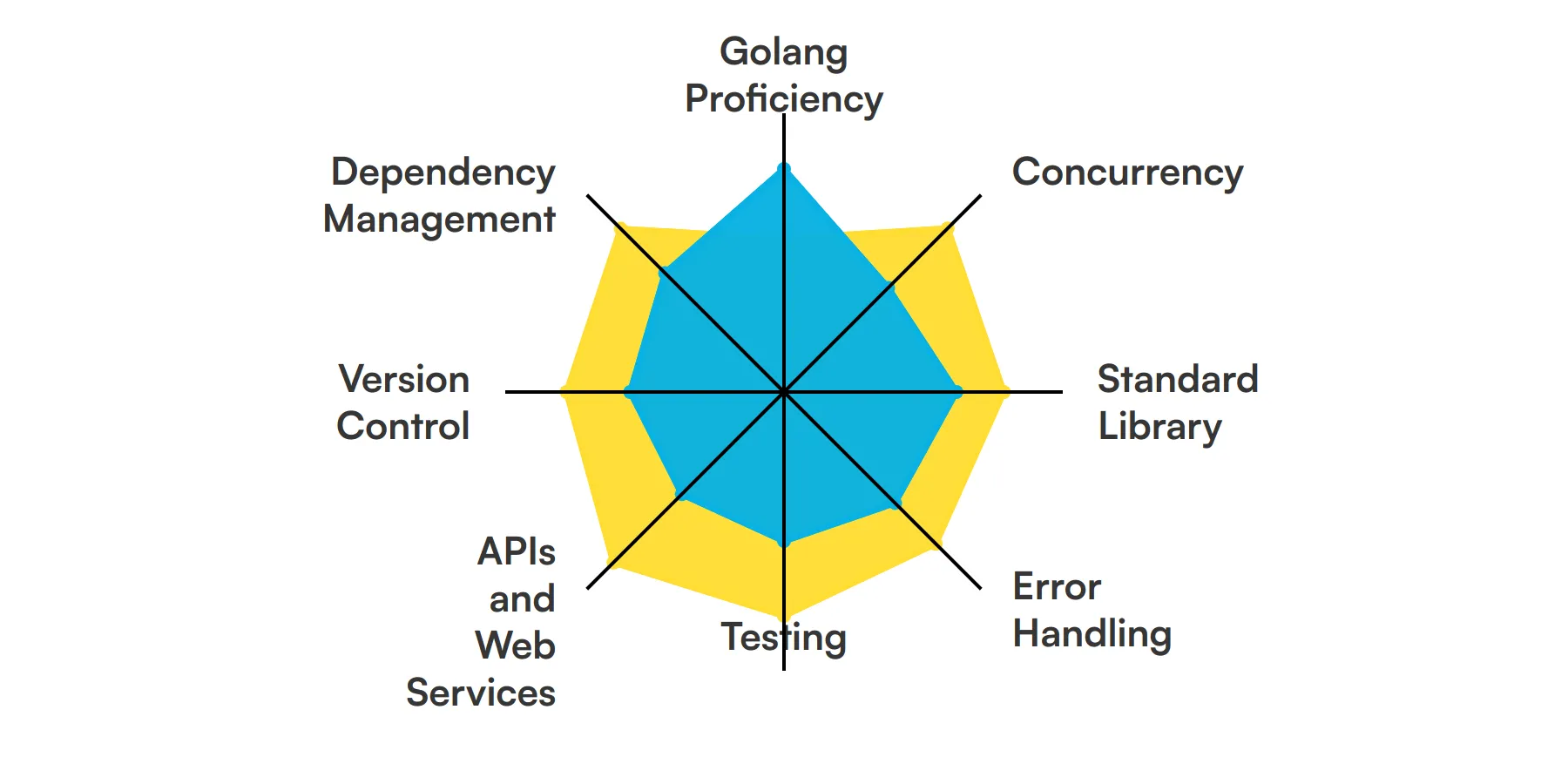
Golang Proficiency
A Golang developer must have a deep understanding of the Go programming language. This includes knowledge of its syntax, idioms, and best practices. Mastery of Go allows developers to write clean, efficient, and maintainable code.
For more insights, check out our guide to writing a Go/Golang Developer Job Description.
Concurrency
Concurrency is a core feature of Go, and a Golang developer should be adept at using goroutines and channels. This skill is crucial for building high-performance applications that can handle multiple tasks simultaneously without compromising on speed or efficiency.
Standard Library
The Go standard library is extensive and powerful. A Golang developer should be familiar with its various packages and how to leverage them to solve common programming problems. This reduces the need for external dependencies and streamlines development.
Check out our guide for a comprehensive list of interview questions.
Error Handling
Effective error handling is essential in Go. Developers need to understand how to use Go's error interface and idiomatic practices for managing errors. This ensures that applications are robust and can gracefully handle unexpected situations.
Testing
Testing is a critical part of the development process. A Golang developer should be proficient in writing unit tests, integration tests, and using Go's testing tools. This helps in maintaining code quality and reliability over time.
APIs and Web Services
Building and consuming APIs is a common task for Golang developers. Knowledge of RESTful principles, JSON, and HTTP protocols is necessary for creating efficient web services and integrating with other systems.
Version Control
Proficiency with version control systems like Git is important for any developer. A Golang developer should be comfortable with branching, merging, and managing code repositories to collaborate effectively with team members.
Dependency Management
Understanding Go modules and dependency management is crucial for maintaining project consistency and reproducibility. A Golang developer should know how to manage dependencies, handle versioning, and ensure that the build process is smooth.
10 secondary Golang Developer skills and traits
The best skills for Golang Developers include Database Knowledge, Docker and Containers, Cloud Services, Microservices Architecture, CI/CD Pipelines, Security Best Practices, Linux/Unix, Networking, Profiling and Optimization and Front-end Basics.
Let’s dive into the details by examining the 10 secondary skills of a Golang Developer.
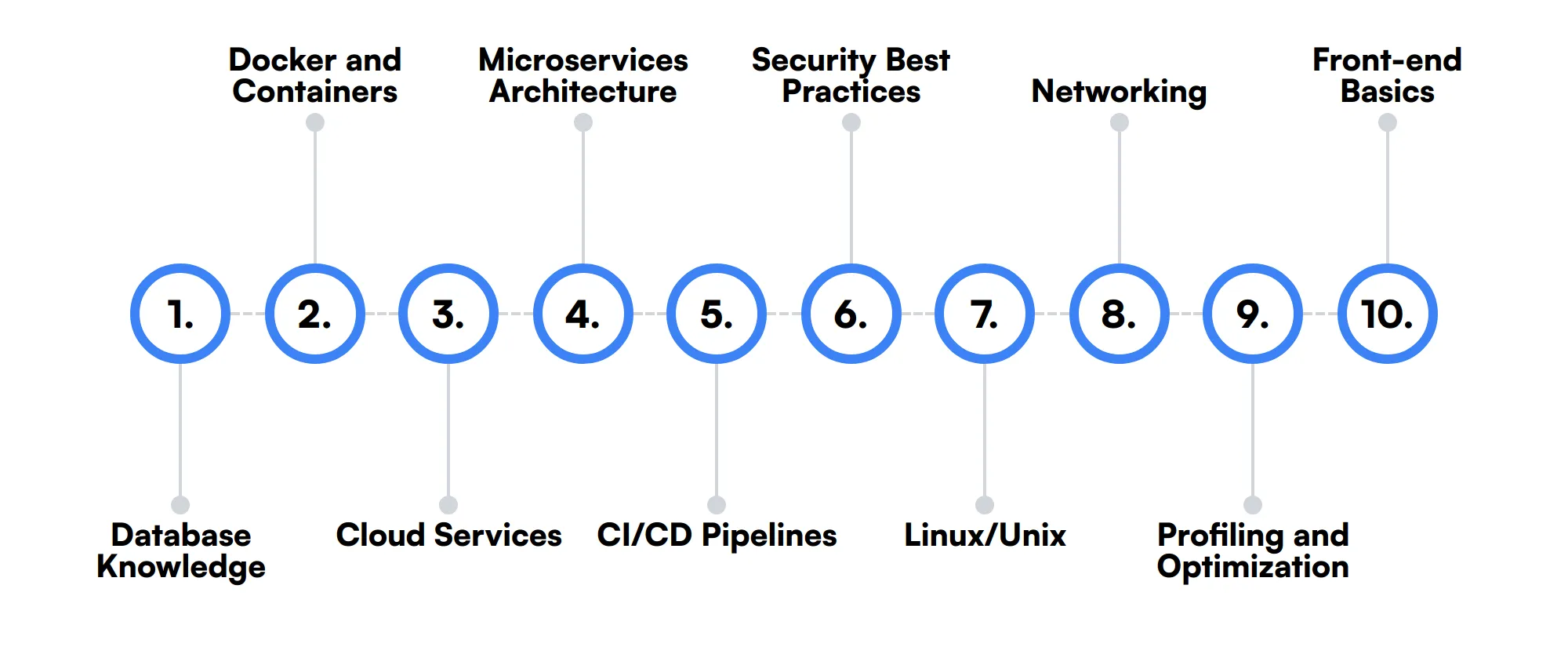
Database Knowledge
Familiarity with SQL and NoSQL databases is beneficial. A Golang developer often needs to interact with databases, so understanding how to design schemas, write queries, and optimize database interactions is useful.
Docker and Containers
Knowledge of Docker and containerization helps in creating consistent development environments and deploying applications. This skill is valuable for Golang developers working in modern DevOps setups.
Cloud Services
Experience with cloud platforms like AWS, GCP, or Azure can be advantageous. Golang developers may need to deploy and manage applications in the cloud, leveraging services like storage, compute, and networking.
Microservices Architecture
Understanding microservices architecture is important for building scalable and maintainable applications. A Golang developer should know how to design, develop, and manage microservices effectively.
CI/CD Pipelines
Continuous Integration and Continuous Deployment (CI/CD) are key practices in modern software development. A Golang developer should be familiar with setting up and maintaining CI/CD pipelines to automate testing and deployment.
Security Best Practices
Security is a critical aspect of software development. A Golang developer should be aware of common security vulnerabilities and best practices to protect applications from threats.
Linux/Unix
Many Go applications run on Linux/Unix systems. Familiarity with these operating systems, including command-line tools and scripting, can be very helpful for a Golang developer.
Networking
Understanding networking concepts and protocols is useful for Golang developers, especially when working on applications that require network communication. This includes knowledge of TCP/IP, DNS, and other networking fundamentals.
Profiling and Optimization
Performance profiling and optimization skills help in identifying bottlenecks and improving the efficiency of Go applications. A Golang developer should know how to use profiling tools and techniques to enhance application performance.
Front-end Basics
While not always necessary, having a basic understanding of front-end technologies like HTML, CSS, and JavaScript can be beneficial. This helps Golang developers collaborate better with front-end teams and understand the full stack.
How to assess Golang Developer skills and traits
Assessing the skills and traits of a Golang developer can be a challenging task. While resumes and portfolios provide a snapshot of a candidate's experience, they often fall short in revealing the true depth of their abilities. To truly understand a developer's proficiency in Golang, you need to evaluate their practical skills and problem-solving capabilities.
A comprehensive assessment should cover key areas such as Golang proficiency, concurrency, standard library usage, error handling, testing, APIs and web services, version control, and dependency management. These skills are fundamental to a Golang developer's role and directly impact their performance on the job.
One effective way to assess these skills is through skills-based hiring practices, such as talent assessments. Adaface on-the-job skill tests can help you achieve a 2x improved quality of hires and an 85% reduction in screening time. These assessments are designed to evaluate a candidate's practical knowledge and problem-solving abilities, ensuring you find the right fit for your team.
Let’s look at how to assess Golang Developer skills with these 4 talent assessments.
Go/Golang Online Test
Our Go/Golang Online Test evaluates a candidate's proficiency in the Go programming language, covering a wide range of topics from concurrency to memory management.
The test assesses their understanding of Go fundamentals, variables and types, functions and methods, control flow, arrays and slices, structs and interfaces, concurrency and channels, error handling and testing, packages and libraries, file handling, JSON and web services, and database connectivity. It includes scenario-based MCQs and a coding question to evaluate hands-on programming skills.
Successful candidates demonstrate a strong grasp of Go's concurrency model, effective error handling, and the ability to develop scalable applications.
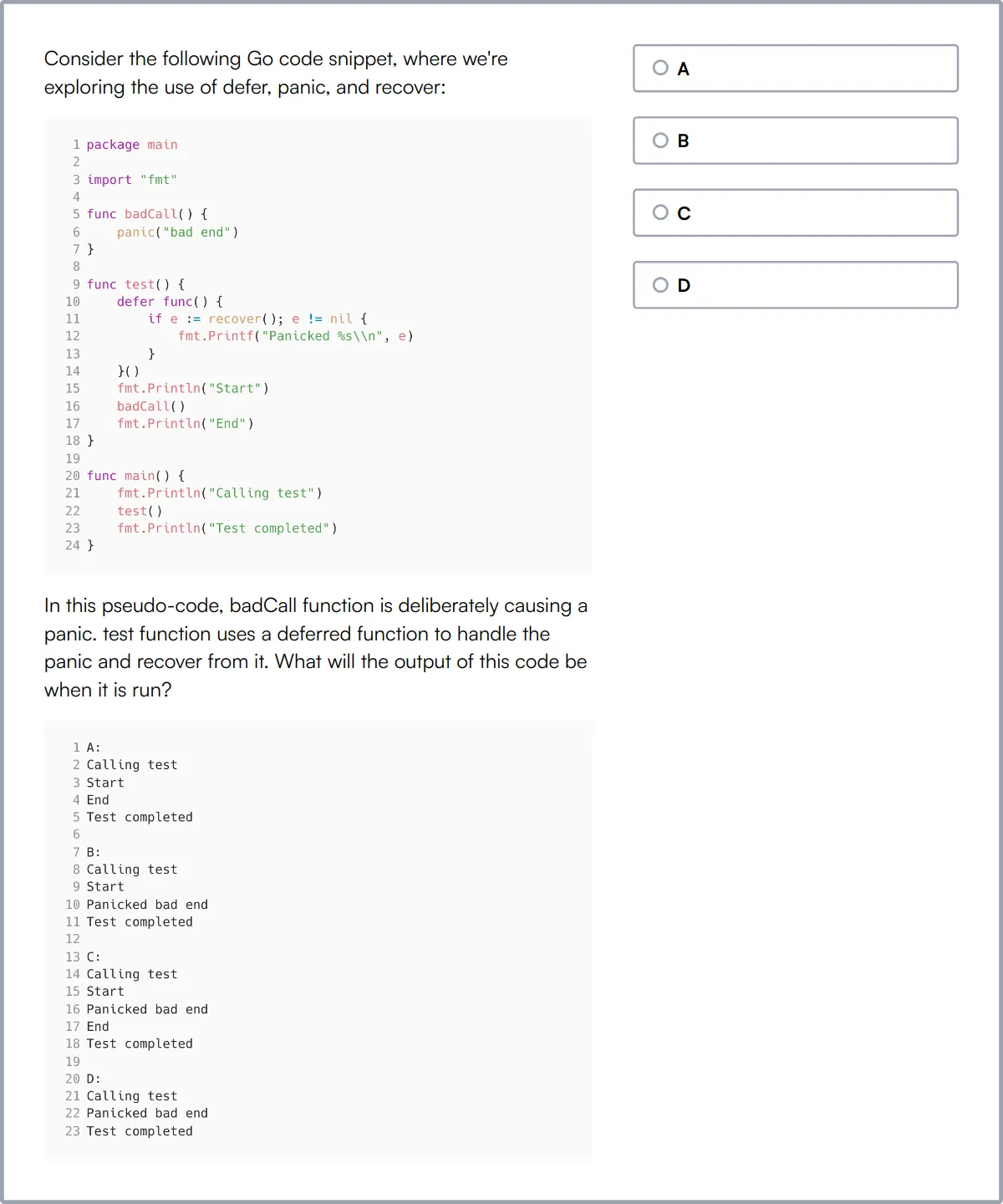
Software Engineering Online Test
Our Software Engineering Online Test evaluates a candidate's understanding of core computer science concepts and their ability to apply them in real-world scenarios.
The test covers object-oriented programming, database design, algorithms and data structures, testing and quality assurance, web development, software security, and code optimization. It includes scenario-based MCQs and a coding question to assess problem-solving and hands-on programming ability.
High-scoring candidates show proficiency in designing efficient algorithms, optimizing code, and ensuring software security and quality.
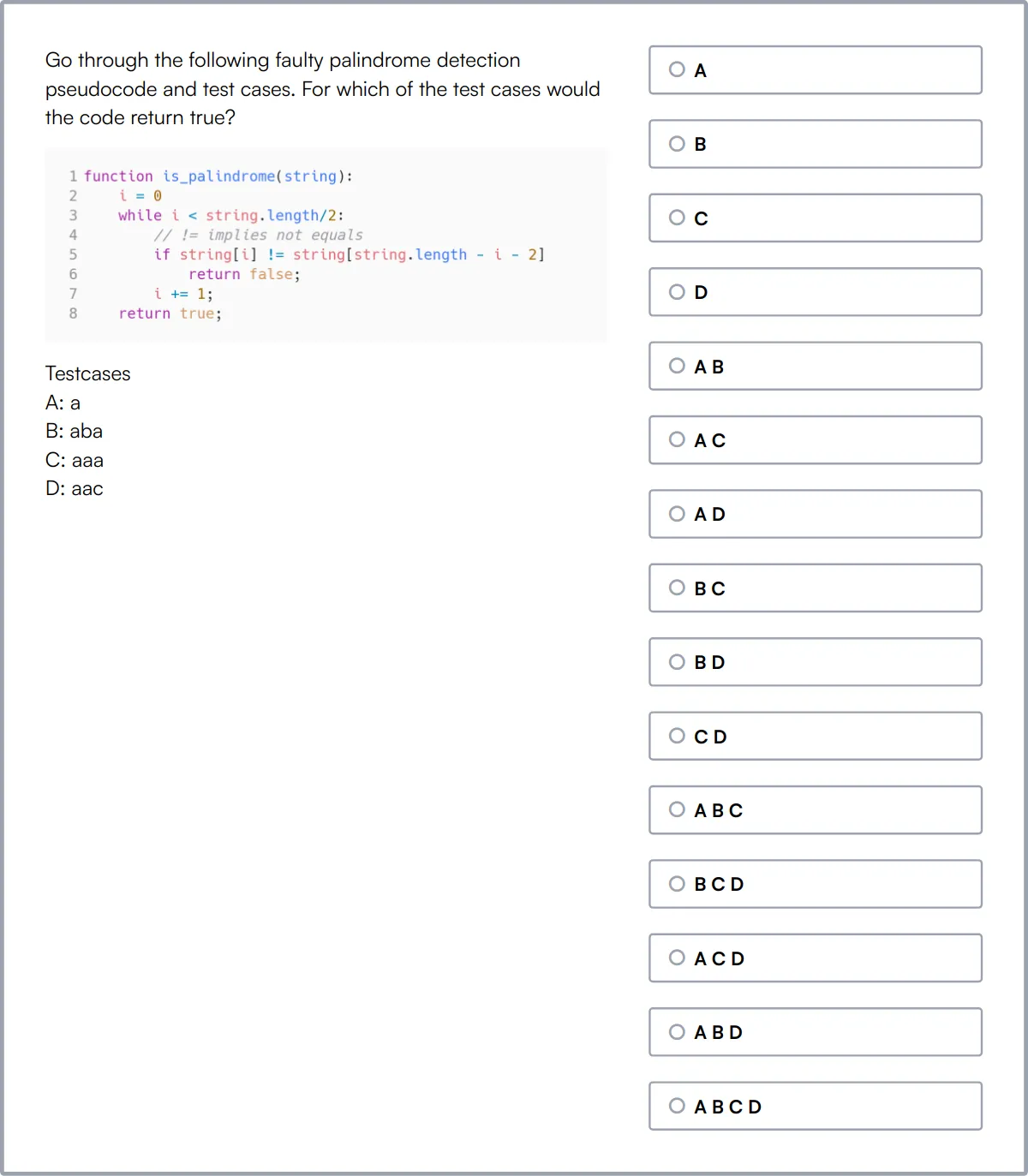
REST API Test
Our REST API Test evaluates a candidate's understanding of RESTful APIs and their ability to create, interact, and test them.
The test covers REST API basics, API design, best practices, designing backend services, and coding. It includes multiple-choice questions to evaluate knowledge of REST principles, HTTP methods, status codes, authentication, serialization formats, and best practices.
Candidates who perform well demonstrate a solid understanding of REST principles and the ability to design and implement robust APIs.
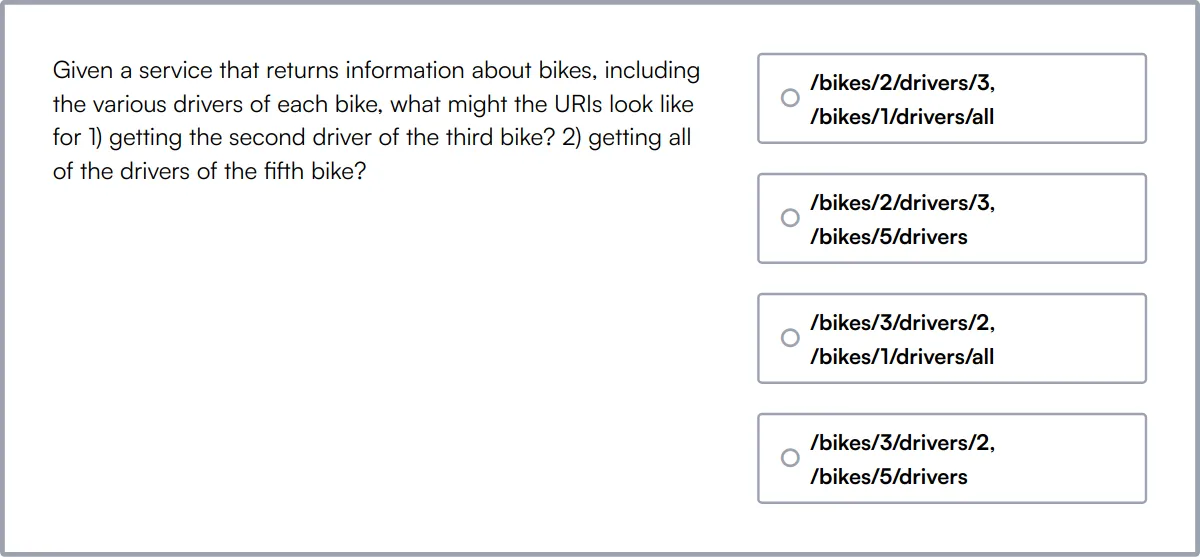
Git Online Test
Our Git Online Test evaluates a candidate's understanding of Git, a popular version control system used in software development.
The test covers Git basics, repository creation, branching and merging, committing changes, conflict resolution, remote repositories, rebasing, Git workflows, Git commands and concepts, and Git branching models. It uses scenario-based MCQs to assess the candidate's knowledge.
Successful candidates demonstrate proficiency in using Git to manage source code, resolve conflicts, and follow best practices in version control.
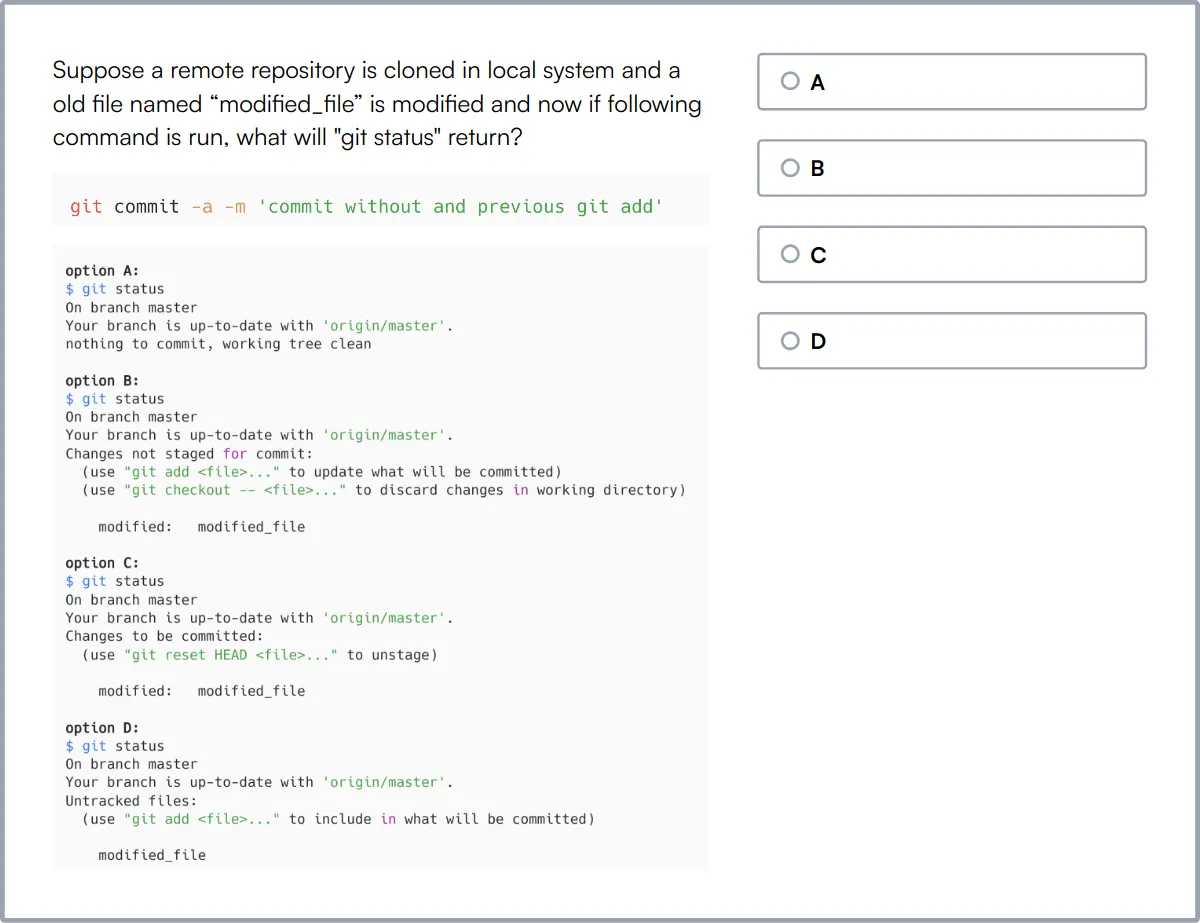
Summary: The 8 key Golang Developer skills and how to test for them
| Golang Developer skill | How to assess them |
|---|---|
| 1. Golang Proficiency | Evaluate their ability to write clean, idiomatic Go code. |
| 2. Concurrency | Assess their understanding and implementation of goroutines and channels. |
| 3. Standard Library | Check their familiarity with Go's built-in packages and functions. |
| 4. Error Handling | Gauge their approach to managing and handling errors in Go. |
| 5. Testing | Determine their skills in writing and executing Go tests. |
| 6. APIs and Web Services | Evaluate their experience in building and consuming RESTful APIs. |
| 7. Version Control | Assess their proficiency with Git for code versioning. |
| 8. Dependency Management | Check their ability to manage dependencies using Go modules. |
Go/Golang Online Test
Golang Developer skills FAQs
What are the key skills to look for in a Golang developer?
Key skills include Golang proficiency, concurrency, standard library usage, error handling, testing, and API development. Knowledge of version control, Docker, cloud services, and microservices architecture is also important.
How can I assess a candidate's proficiency in Golang?
Assess proficiency through coding tests, technical interviews, and reviewing past projects. Look for understanding of syntax, idiomatic Go practices, and problem-solving abilities.
Why is concurrency important for Golang developers?
Concurrency is a core feature of Go, allowing efficient handling of multiple tasks. Assess understanding of goroutines, channels, and synchronization techniques.
What should I look for in a candidate's error handling skills?
Evaluate their approach to error handling, including use of Go's error type, custom error types, and best practices for returning and logging errors.
How can I evaluate a candidate's experience with APIs and web services?
Review their experience with RESTful APIs, gRPC, and web frameworks like Gin or Echo. Ask about their role in designing, implementing, and maintaining APIs.
What is the importance of testing in Golang development?
Testing ensures code reliability and maintainability. Assess knowledge of Go's testing package, writing unit tests, integration tests, and using tools like Testify.
How do I assess a candidate's knowledge of Docker and containers?
Ask about their experience with Dockerfile creation, container orchestration, and deployment. Look for familiarity with Docker Compose and Kubernetes.
What should I consider when evaluating a candidate's database knowledge?
Check their experience with SQL and NoSQL databases, ORM libraries like GORM, and database design principles. Ask about their role in database schema design and optimization.

40 min skill tests.
No trick questions.
Accurate shortlisting.
We make it easy for you to find the best candidates in your pipeline with a 40 min skills test.
Try for freeRelated posts
Free resources



